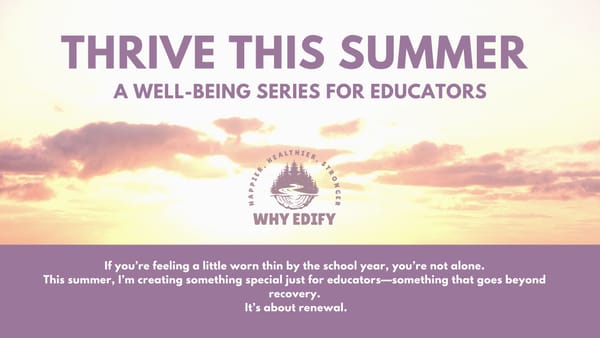Tell Your Story
Topics for this week include standards-based grading, school social media use, and how to use retrieval practice.

Happy Friday!
T.G.I.F. Teacher Newsletter #74
Check out Refind. Every day Refind picks 7 links from around the web for you, tailored to your interests. It has over 50k+ curious users.
This week it felt like summer. I paint houses with five other teachers and this week we finished three jobs. This is my 24th summer painting with the same crew.
I'm also preparing to go on a fishing adventure with my dad and brother. It's time for me to take a much-needed "nature pill".
I'll still be sending out the newsletter next week to keep the streak alive, but the format may be a bit different. Perhaps I'll have a picture of a fish or two?
Have a great weekend and thank you for reading!
In today’s newsletter…
- Standards-based grading can be improved with clear criteria for exceptional performance.
- Social media can be a useful tool for schools and teachers to engage parents and highlight positives about the school.
- Retrieval practice is an effective learning strategy, and "Leave One, Add One" is a fun activity to implement it.
The News
Here are some articles that grabbed my attention.
- Standards-Based Grading - If you use standards-based grading, you may struggle with the “Exceeds Standard” label. It’s vague and difficult to interpret and can cause communication problems for students, parents, and teachers. It isn’t easy to measure, and motivating a level beyond “meets standard” is challenging. Clear criteria for exceptional performance, such as “Distinguished, “Exceptional,” or “Exemplary,” might serve communication purposes better than “Exceeds Standard.”
- Tell Your Story - Social media can be an effective way for schools and teachers to engage parents and the larger community when content is focused on storytelling and highlighting core values Parents who've had negative school experiences tend to pass that outlook on to their children, but social media can help schools engage with them and highlight positives about the school during difficult times. Schools should choose social media platforms based on their goals and target audiences, and leverage their content to tell stories and incorporate their core values. Consistency, accuracy, and paying attention to analytics are also key to social media success. Teachers can also do this by sending home simple newsletters at regular intervals. These days it seems you have to tell your story or someone else will tell it for you.
- Retrieval Practice - Leave One, Add One is a fun and effective retrieval practice activity that boosts long-term learning. In this activity, students anonymously write down one concept they’ve learned in class and then pass their sheet to a classmate who adds a new idea. This process continues for several rounds until students start receiving papers they’ve had before. The activity concludes with a class discussion where students share something cool they’ve learned from someone else’s paper.
- Tweet - I asked, “What are your tips for keeping students engaged while watching instructional videos?” It was viewed over 37,000 times! There are some replies worth checking out. I’ve come to appreciate how Twitter can act as one gigantic Professional Learning Community. You can read it here.
Growth
Personal Development and Wellness Resources
- Nature Pill - Spending time in nature can improve both physical and mental health. According to a recent study by The Finnish Institute for Health and Welfare, frequent visits to green spaces were associated with less frequent use of medications for psychotropic, anti-hypertensive, and asthma. Spending time in nature may help improve symptoms related to hypertension, asthma, and depression, and even help fight cancer.
- Own It - Why do people persist in being wrong? Researchers at Stanford conducted a study in 1975 involving suicide notes; students were asked to distinguish between genuine and fake notes and were later told their scores were fictitious. After being informed of this deception, students in the high-score group still believed they had done well, and those in the low-score group believed they had done poorly. This is known as confirmation bias. It’s just one of many ways humans exhibit irrational thinking, according to cognitive scientists Hugo Mercier and Dan Sperber in their book, "The Enigma of Reason."
- Live Better - What would you include on your list of 100 Tips for a Better Life? Here are some ideas to get you started.

Inspiration
"A human being is a part of the whole called by us universe, a part limited in time and space. He experiences himself, his thoughts, and his feelings as something separated from the rest, a kind of optical delusion of his consciousness. This delusion is a kind of prison for us, restricting us to our personal desires and to affection for a few persons nearest to us. Our task must be to free ourselves from this prison by widening our circle of compassion to embrace all living creatures and the whole of nature in its beauty." - Albert Einstein
Favorite Things
- Good News - Thinking Huts built its first 3D-printed school in the town of Fianarantsoa, a city in south-central Madagascar. Their long-term vision is to give as many people as possible access to education.
- Cupcakes - My daughter made some fantastic cupcakes from scratch. They were delicious.

❤ Enjoy this Newsletter?
🍵 Show Your Support, 🛍 Shop The Store, 👕 Buy Some Swag, 🤗 Share It



